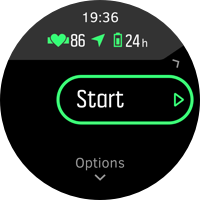The following article will explain how distance and heart rate are measured while open water swimming, provide useful tips and troubleshooting steps.
Distance measurement via GPS
When swimming in Open water sport mode, your Suunto tracks distance via GPS. Even though the watch’s algorithm is optimized for challenging environments, the tracking may be influenced by the following external factors:
- GPS signal reflections from the water impact the location accuracy.
- GPS signal will be lost every time the watch is underwater as the signal does not travel under the surface of the water.
The following tips may help improve the distance measurement via GPS:
- Sync your watch with the Suunto app right before starting the exercise, to update the satellite orbit data of your watch. This will help find a GPS signal faster and improve the overall track quality.
- Wait for your watch to find the GPS signal before entering the water - the arrow on the exercise start screen turns green once the GPS signal is found.
If possible, wait for an additional few minutes after the GPS was found before starting the exercise. This will “warm up” the GPS and allow your watch to download necessary GPS information from the satellites. - During swimming ensure that the arm you wear your watch on clearly comes out of the water.
Note: Some swimming styles like breast swimming may not be suitable for open water swimming as the watch will stay mainly underneath the water surface which blocks the GPS signal. - Most swimmers are not moving symmetrically. To improve the tracking, try wearing the watch on the other hand.
- For better tracking results, we recommend putting the watch inside your swimming cap or in a buoy (e.g. from Orca) and to use a chest HR belt to track your heart rate.
Heart rate measurement while swimming
Most Suunto watches track heart rate from your wrist during exercise. For swimming, we highly recommend using a chest heart rate sensor since the wrist heart rate sensor may not provide accurate readings as water passing under the watch affects the optical sensor's ability to read heart rate accurately.
Keep in mind when using an HR belt for swimming:
- Before entering the water:
After pairing the HR belt with your watch, make sure that the open water sport mode is connected to the HR belt before entering the water. Both belt and watch must be outside the water when connecting them. If possible, wait for a few minutes to allow your watch and HR belt to synchronize. When your heart rate has been picked up, you are ready to go.
- While swimming:
The HR belt will record your heart rate during exercise and will store the data on the belt module. The data will be synced to your watch when you end the exercise.
Note: The memory function is only available for Suunto Smart Sensor belts when used with Suunto watches. - Ending the exercise:
End your exercise only after both your HR belt and watch are outside the water and your watch has picked up your heart rate – it is shown on the exercise view. When ending the exercise while either the HR belt or the watch is still underwater, your heart rate data will not be synced to the watch. - Tip if you prefer using wrist heart rate:
Using a wet suit may help to get more accurate WHR tracking. Put the wet suit on top of the watch to cover it from water and light.











